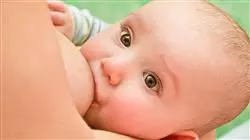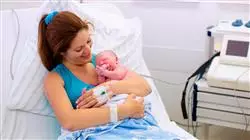University certificate
Scientific endorser

The world's largest faculty of nursing”
Introduction to the Program
This program includes exceptional teaching material, providing you with a contextual approach that will facilitate your learning”

The postpartum period represents the time it takes for the reproductive system to recover completely after childbirth, which usually lasts between five and six weeks. During these weeks, women need time to recover, both hormonally and physically. This Professional master’s degree in Postpartum Care for Nursing aims to prepare professionals through comprehensive global and practical learning in regards to one of the stages of women's sexual and reproductive life.
The up-to-date contents of this program and its integrative approach will provide a comprehensive view of all aspects related to the postpartum period. The contents will provide an overview of the various needs of women and newborns during the postpartum period, both in physiological situations and in those that deviate from normality.
In this sense, this Professional master’s degree by TECH offers students a comprehensive vision of postpartum nursing from a theoretical and eminently practical perspective. The program is divided into multiple modules, making up a total of topics through which students will acquire a global and in-depth knowledge of the subject.
Both the design of the program and the educational material used will facilitate the understanding of concepts, while carrying out practical cases will help to adapt what has been learned into clinical practice. In this way, this Professional master’s degree will provide immersive learning in order to prepare professionals for real situations in their daily professional practice.
This program may be useful for students seeking an initial postgraduate specialization program, specifically in postpartum studies, or for people who are developing their profession in this field and decide to catch up by studying a fully up-to-date program that includes all the new developments in force up to the date of its release and which, in addition, is committed to continuous updating to include all future developments.
It is, therefore, not just another qualification for your professional profile, rather, a real learning tool to approach the specialty topics in a modern, objective way and with the ability to make a judgment based on today's most cutting-edge literature.
The Postpartum period is a complex time in a woman's life and nurses are the right professionals to deal with it”
This Professional master’s degree in Postpartum Care for Nursing contains the most complete and up-to-date scientific program on the market. Its most notable features are
- Practical cases presented by experts in Postpartum Nursing
- The graphic, schematic, and practical contents with which they are created, provide scientific and practical information on the disciplines that are essential for professional practice
- Latest advances in Postpartum Nursing
- Practical exercises where self-assessment can be used to improve learning
- A special emphasis on innovative methodologies in the field of postpartum care
- Theoretical lessons, questions to the expert, debate forums on controversial topics, and individual reflection assignments
- Content that is accessible from any fixed or portable device with an Internet connection
This Professional master’s degree may be the best investment you can make when selecting a refresher program, for two reasons: in addition to updating your knowledge in Postpartum Care for Nursing, you will obtain a qualification from TECH Global University"
The teaching staff includes professionals from the field of Postpartum Care for Nursing, who contribute their work experience to this program, as well as renowned specialists from leading societies and prestigious universities.
The multimedia content, developed with the latest educational technology, will provide professionals with situated and contextual learning, i.e., a simulated environment that will provide immersive education programmed to learn in real situations.
This program is designed around Problem-Based Learning, whereby professionals must try to solve the different professional practice situations that arise throughout the program. For this purpose, professionals will be assisted by an innovative Interactive video system, developed by renowned and experienced experts in Postpartum Nursing.
Nursing professionals must specialize in postpartum care, as it is a complex moment in a woman's life"

Women's care after childbirth must be carried out with extreme care due to the possible diseases that may arise in the postpartum period"
Why study at TECH?
TECH is the world’s largest online university. With an impressive catalog of more than 14,000 university programs available in 11 languages, it is positioned as a leader in employability, with a 99% job placement rate. In addition, it relies on an enormous faculty of more than 6,000 professors of the highest international renown.

Study at the world's largest online university and guarantee your professional success. The future starts at TECH”
The world’s best online university according to FORBES
The prestigious Forbes magazine, specialized in business and finance, has highlighted TECH as “the world's best online university” This is what they have recently stated in an article in their digital edition in which they echo the success story of this institution, “thanks to the academic offer it provides, the selection of its teaching staff, and an innovative learning method aimed at educating the professionals of the future”
A revolutionary study method, a cutting-edge faculty and a practical focus: the key to TECH's success.
The most complete study plans on the university scene
TECH offers the most complete study plans on the university scene, with syllabuses that cover fundamental concepts and, at the same time, the main scientific advances in their specific scientific areas. In addition, these programs are continuously being updated to guarantee students the academic vanguard and the most in-demand professional skills. In this way, the university's qualifications provide its graduates with a significant advantage to propel their careers to success.
TECH offers the most comprehensive and intensive study plans on the current university scene.
A world-class teaching staff
TECH's teaching staff is made up of more than 6,000 professors with the highest international recognition. Professors, researchers and top executives of multinational companies, including Isaiah Covington, performance coach of the Boston Celtics; Magda Romanska, principal investigator at Harvard MetaLAB; Ignacio Wistumba, chairman of the department of translational molecular pathology at MD Anderson Cancer Center; and D.W. Pine, creative director of TIME magazine, among others.
Internationally renowned experts, specialized in different branches of Health, Technology, Communication and Business, form part of the TECH faculty.
A unique learning method
TECH is the first university to use Relearning in all its programs. It is the best online learning methodology, accredited with international teaching quality certifications, provided by prestigious educational agencies. In addition, this disruptive educational model is complemented with the “Case Method”, thereby setting up a unique online teaching strategy. Innovative teaching resources are also implemented, including detailed videos, infographics and interactive summaries.
TECH combines Relearning and the Case Method in all its university programs to guarantee excellent theoretical and practical learning, studying whenever and wherever you want.
The world's largest online university
TECH is the world’s largest online university. We are the largest educational institution, with the best and widest online educational catalog, one hundred percent online and covering the vast majority of areas of knowledge. We offer a large selection of our own degrees and accredited online undergraduate and postgraduate degrees. In total, more than 14,000 university degrees, in eleven different languages, make us the largest educational largest in the world.
TECH has the world's most extensive catalog of academic and official programs, available in more than 11 languages.
Google Premier Partner
The American technology giant has awarded TECH the Google Google Premier Partner badge. This award, which is only available to 3% of the world's companies, highlights the efficient, flexible and tailored experience that this university provides to students. The recognition as a Google Premier Partner not only accredits the maximum rigor, performance and investment in TECH's digital infrastructures, but also places this university as one of the world's leading technology companies.
Google has positioned TECH in the top 3% of the world's most important technology companies by awarding it its Google Premier Partner badge.
The official online university of the NBA
TECH is the official online university of the NBA. Thanks to our agreement with the biggest league in basketball, we offer our students exclusive university programs, as well as a wide variety of educational resources focused on the business of the league and other areas of the sports industry. Each program is made up of a uniquely designed syllabus and features exceptional guest hosts: professionals with a distinguished sports background who will offer their expertise on the most relevant topics.
TECH has been selected by the NBA, the world's top basketball league, as its official online university.
The top-rated university by its students
Students have positioned TECH as the world's top-rated university on the main review websites, with a highest rating of 4.9 out of 5, obtained from more than 1,000 reviews. These results consolidate TECH as the benchmark university institution at an international level, reflecting the excellence and positive impact of its educational model.” reflecting the excellence and positive impact of its educational model.”
TECH is the world’s top-rated university by its students.
Leaders in employability
TECH has managed to become the leading university in employability. 99% of its students obtain jobs in the academic field they have studied, within one year of completing any of the university's programs. A similar number achieve immediate career enhancement. All this thanks to a study methodology that bases its effectiveness on the acquisition of practical skills, which are absolutely necessary for professional development.
99% of TECH graduates find a job within a year of completing their studies.
Professional Master's Degree in Puerperium for Nursing
The puerperium is a period of recovery, in which the mother needs constant attention and special care to help her return to her pre-pregnancy state and thus, start the breastfeeding period. Therefore, it is essential to ensure quality medical care, with which it is possible for her to stay healthy and meet the necessary conditions to care for her baby. The Professional Master's Degree in Puerperium for Nursing, created by TECH, meets the learning requirements demanded by medical practice in this area. Throughout the 12 months of training, the nurse will have the tools to multidisciplinarily manage standard and risk situations faced by their patients. Thanks to the curriculum, you will be able to expand your knowledge of physical assessment, neonatal screening and newborn hearing impairment screening, both in early and non-early cases. With this Professional Master's Degree, you will also be able to guide your patients in nutrition, lactation, reproductive health and primary care for newborns.
Postgraduate in Puerperium in Nursing
The group of teachers of the Nursing Faculty of TECH Global University has designed this complete postgraduate course, with the objective of training the nurse in the practice of assisting women in the transitional period between childbirth and postpartum. The content, designed for educational purposes, covers from the physical aspects of the puerperium to the psychological and emotional aspects of this period. In addition, topics related to health education, self-care and monitoring of typical and atypical situations are addressed, as well as those related to childhood, maternity and family. Through the methodology of Problem Based Learning, case analysis and re-learning, the Nursing professional will be able to polish their skills in daily care practice and integrate a global and biopsychosocial vision to their daily work.







